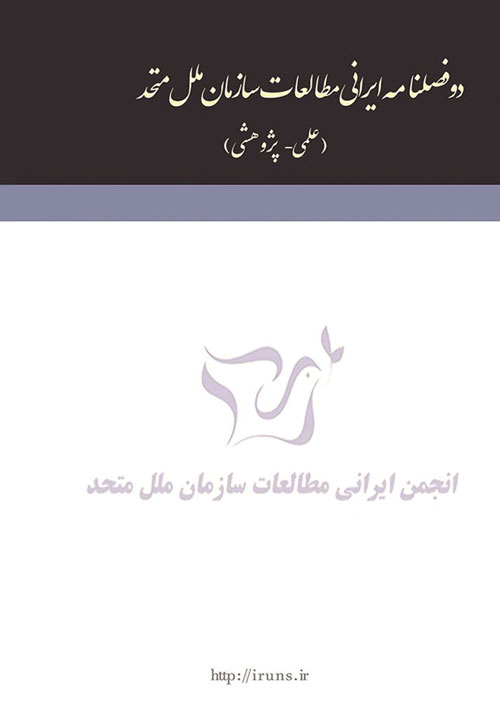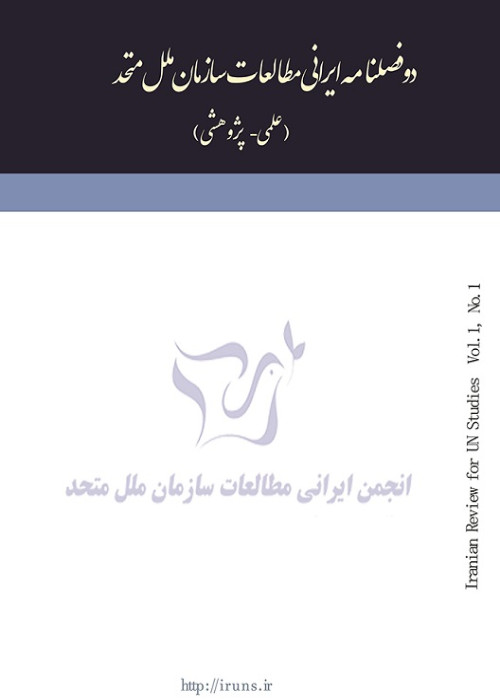فهرست مطالب

The Iranian Review for UN Studies
Volume:3 Issue: 1, Winter and Spring 2020
- تاریخ انتشار: 1400/10/13
- تعداد عناوین: 5
-
-
صفحات 1-19
بر اساس ماده 78 آیین دادرسی دیوان بین المللی دادگستری می تواند از هر یک از طرف های اختلاف اطلاعاتی را درخصوص اجرای دستور موقتی که خود صادر کرده است درخواست کند. با این که این مقرره در راستای اجرای هرچه بیشتر دستور موقت دیوان است این نکته قابل توجه است که آن در رویه دیوان چندان مورد توجه قرار نگرفته است. دیوان در قضیه نقض های ادعایی عهدنامه مودت برخلاف رویه سابق خود تنها چند ماه پس از صدور دستور موقت رویکرد بدیعی را نسبت به اعمال اختیار خود بر اساس ماده 78 در پیش گرفت. بدین ترتیب که از ایالات متحده آمریکا درخواست کرد که اطلاعات مربوط به اجرای دستور موقت را حداکثر ظرف مدت 48 روز به دیوان ارایه دهد. تکرار و تایید این رویکرد بدیع در قضایای آتی این امکان را برای دیوان فراهم می کند تا بتواند بعنوان یک نهاد نظارتی در راستای تضمین اجراء دستور موقت های خود ایفاء نقش کند.
کلیدواژگان: دیوان بین المللی دادگستری، ماده 78، اقدامات تامینی، قضیه نقض های ادعایی عهدنامه مودت، جمهوری اسلامی ایران، ایالات متحده آمریکا -
صفحات 21-50
در دهه های اخیر،جنبه های گوناگونی از بحران محیط زیست آشکار شده است .به دنبال ایجاد چنین وضعیت بغرنجی، مطالعاتی از نقطه نظرات متفاوت انجام گرفته و راه حل هایی در خصوص این مساله مطرح شده است، که از جمله آنها می توان به مطالعات میشل لینچ در حوزه جرایم علیه محیط زیست اشاره داشت که تحت عنوان جرم شناسی سبز مورد بررسی قرار گرفته است.در این راستا، جهت ارایه ی راه حل هایی بهتر در حل مسایل زیست محیطی، پیشنهاد ادغام نظریه جرم شناسی سبز و جرم شناسی فرهنگی از سوی نایجل ثاوث و اوی بریسمن طرح شد. همچنین ، سازمان ملل به عنوان ماموریت خود در حفظ و حمایت از محیط زیست، همواره درگیر مباحث و مسایل زیست محیطی بوده و ابزارهایی را در این خصوص به کار گرفته است.این پژوهش بر اساس روش توصیفی - تحلیلی به تعریف جرم شناسی سبز پرداخته و همچنین تحلیل هایی در خصوص ضرورت ادغام نظریه جرم شناسی فرهنگی با جرم شناسی سبز ارایه نموده است.پژوهش حاضر به دنبال طرح پیشنهاداتی برای کمک به محیط زیست و نسل های آینده در پرتو اسناد مرتبط با سازمان ملل برآمده است.همچنین برخی راهکارهای عملی مبتنی بر نظریه جرم شناسی فرهنگی سبز و اهداف سازمان ملل برای حل بحران محیط زیست مورد بحث و بررسی قرار گرفته است.
کلیدواژگان: جرم شناسی فرهنگی سبز، بحران محیط زیست، راهکارهای عملی، اقدامات سازمان ملل، اسناد بین المللی -
صفحات 51-81
در 30 ژانویه 2020، سازمان بهداشت جهاتنی شیوع کوید-19 را به عنوان یک اورژانس سلامت عمومی با نگرانی بین المللی اعلام کرد. از آن تاریخ دولت ها در تلاش هستند تا قواعدی را برای کنترل این وضعیت تنظیم کنند. اما این امر واضح است که دولت ها به تنهایی و بدون اقدام مقتضی سایرین مانند شرکت ها و بنگاه های تجاری به عنوان بازیگران غیردولت قادر به حل این مساله نیستند. اما بسیاری از بنگاه های تجاری از این محدودیت ها پیروی نکرده اند یا تلاش کرده که این محدودیت ها را تغییر دهند. اگر یک واحد تجاری از قواعد در این وضعیت تبعیت نکند، یا یک گزارش اشتباه در رابطه با اقدامات اتخاذی مربوط به بیماری ارایه دهد، این اقدامات می تواند منجر به شکل گیری زنجیره ای از وقایع در جهان شود. لذا، جامعه بین الملل می تواند تکالیفی برای این بازیگران در نظر گیرد.این اقدامات منجر به سوال در خصوص حقوق و تکالیف بازیگران غیردولت برای همکاری با سایرین و احترام به قواعد بین المللی در این مورد می شود. لذا این مقاله به این بحث می پردازد که این وقایع به این منجر خواهد شد که بازیگران غیردولت مسئولیت داشته باشند.
کلیدواژگان: مسئولیت اجتماعی، ارزیابی بایسته، شرکت، بازیگران غیردولت، کووید-19 -
صفحات 83-109
مراجع قضایی بین المللی به ویژه دیوان بین المللی دادگستری همواره نقش محوری در فرایند شناسایی قواعد حقوق بین الملل عرفی ایفاء می نمایند. در این چارچوب بخصوص در دهه های اخیر، رویکرد رویه قضایی بین المللی به دلیل اصول انسانیت و حقوق انساندوستانه دستخوش تغییر و تحول گردیده است. برخلاف رویکرد سنتی که در روند شناسایی قواعد عرفی تکیه نخستش بر رویه دولتها بوده است، در رویکرد جدید، تکیه اولیه بر اعتقاد حقوقی(Opinio Juris) می باشد. چنین رویکردی مورد حمایت گزارشگر ویژه کمیسیون حقوق بین الملل در گزارش پنجم و نهایی خود در سال 2018 نیز می باشد. لذا در چارچوب مقاله حاضر، تلاش شده ظهور این رویکرد جدید در فرایند شناسایی قواعد عرفی در حقوق بین الملل مورد بحث قرار بگیرد. به همین منظور از رهگذر تجزیه و تحلیل دکترین در این باب و رویه قضایی مرتبط موجود از جمله آراء دیوان بین المللی دادگستری و نیز مباحثات کمیسیون حقوق بین الملل، تغییر در روند شناسایی قواعد عرفی مورد بررسی قرار می گیرد.
کلیدواژگان: حقوق بین الملل عرفی، دیوان بین المللی دادگستری، عرف جدید، جامعه بین المللی
-
Pages 1-19
According to Article 78 of the Rules of the International Court of Justice, the Court may request information from the parties on any matter connected with the implementation of any provisional measures it has indicated. While this provision makes it more likely that the provisional measures will be implemented, it is notable that it remains unexplored in the Court’s case-law. In the case relating to the “Alleged Violations of the Treaty of Amity”, the Court adopted an innovative approach and, contrary to its practice, exercised its power under Article 78 only a few months after it ordered the provisional measures. It thus requested the United States of America to notify the Court of any measures taken to execute the provisional measures within a maximum of 48 days. It is argued here that repetition and confirmation of this innovative approach in future cases will make it possible for the Court to act as a supervisory entity assuring the implementation of any provisional measures it has ordered.
Keywords: International Court of Justice, ICJ, Article 78, Provisional Measures, “Alleged Violations of the Treaty of Amity” case, Islamic Republic of Iran, United States of America -
Pages 21-50
In recent decades, the different aspects of environmental crisis have been depicted. Based on such a dangerous situation, some studies have been made from different perspectives and some solutions have been provided. One of these studies, as suggested by Michael Lynch on environmental issues and crimes against environment, concerns green criminology (“GC”). Additionally, two scholars, Nigel South and Avi Brisman, have proposed merging two theories with a view to offering better solutions in this area. Likewise, the United Nations, as its mission, has been involved in these kinds of environmental issues and based on that, some instruments have been approved. The present article employs descriptive analytical research approach to define green criminology. It also proposes some other analyses to justify merging these two theories. In addition, it provides suggestions to help the environment and the coming generation in light of some related UN documents. This article will examine some practical solutions based on both green cultural criminal theory and UN aims for solving environmental crisis.
Keywords: green cultural criminology, Environmental crisis, practical solutions, United Nations actions, International Documents -
Pages 51-81
On 30 January 2020, the World Health Organization referred to the COVID-19 outbreak as a public health emergency of international concern. Since then, many governments have been trying to set rules to control the situation. However, it was clear from the outset that they would fail to tackle this problem if non-state actors such as businesses or companies did not take appropriate measures in that respect. Nevertheless, many businesses have either refused to comply with the relevant restrictions or sought to change them. If a company does not provide the facilities required for this situation or submits a false report concerning the essential measures, the world may face a chain of events impacts of which would be global. Therefore, the international community might consider specific responsibilities that should be shouldered by these actors. This challenge raises profound questions about the role that corporates, as non-state actors, may play in cooperating with states and international organizations. This article argues that, under these circumstances, these non-state actors bear responsibility for their failure to implement the required measures.
Keywords: social responsibility, Due Diligence, corporates, Non-state actors, COVID-19 -
Pages 83-109
International courts and tribunals, including the International Court of Justice (ICJ), have always played a crucial role in the process of identifying rules of customary international law (CIL). In this area, especially in recent decades, the approach that is employed as international jurisprudence has been modified because the principles of humanity and humanitarian law have evolved. Unlike the traditional approach that relies initially on the practice of states, this newly-emerged approach – which was also supported by the Special Rapporteur of the International Law Commission (ILC) in its fifth report in 2018 – seeks to identify opinio juris in the first place. What we have discussed in the present article is the necessity of the introduction of a new approach to the identification of customary rules in international law. For this purpose, we attempted to collect and analyze the concurring opinions and arguments that exist in judicial jurisprudence of various international tribunals such as the ICJ, as well as those of the ILC as ubiquitous evidence to establish a change in the process of the identification of custom.
Keywords: Customary International Law, International Court of Justice, Modern Custom, International Community -
Pages 111-121
In the early hours of 3 January 2020, the United States military carried out a drone attack to assassinate General Ghassem Soleimani, head of the Iranian Islamic Revolution Guard Corps-Quds Force, and his entourage at Baghdad International Airport in Iraq. The attack, which was ordered by US President Donald Trump, also killed nine others, including Abu Mahdi al-Muhandis, de facto leader of the Iraqi Popular Mobilisation Forces and founder of the Kata’ib Hezbollah militia.Unsurprisingly, the assassination of General Soleimani soon turned into a hotly-debated issue on a global scale. The crux of the debate among politicians, international law experts and international relations analysts revolved around whether the US drone strike was permissible according to the relevant rules of international law.
Keywords: use of force, International Humanitarian Law, International Human Rights Law, Armed Conflict, the Iranian Association for United Nations Studies


